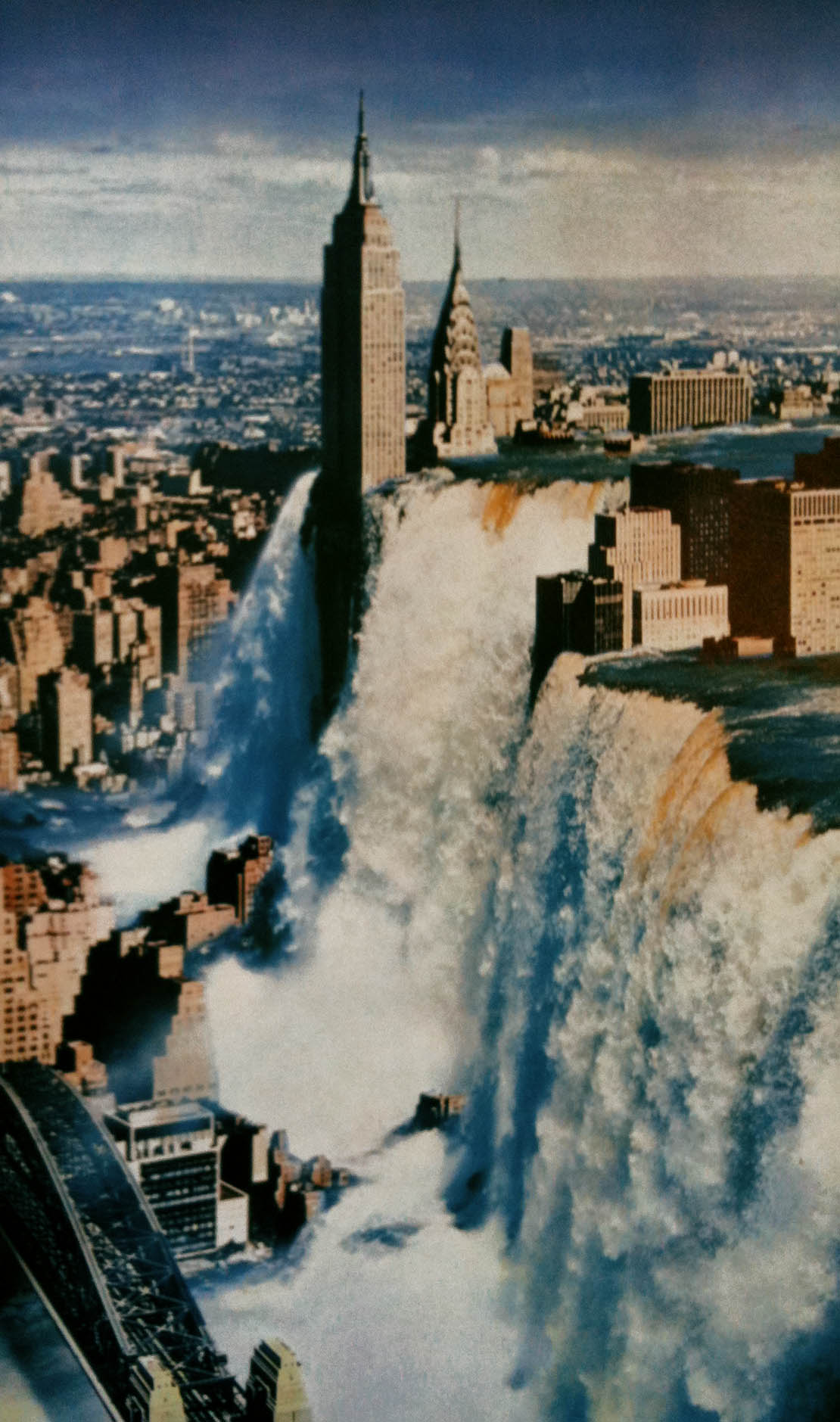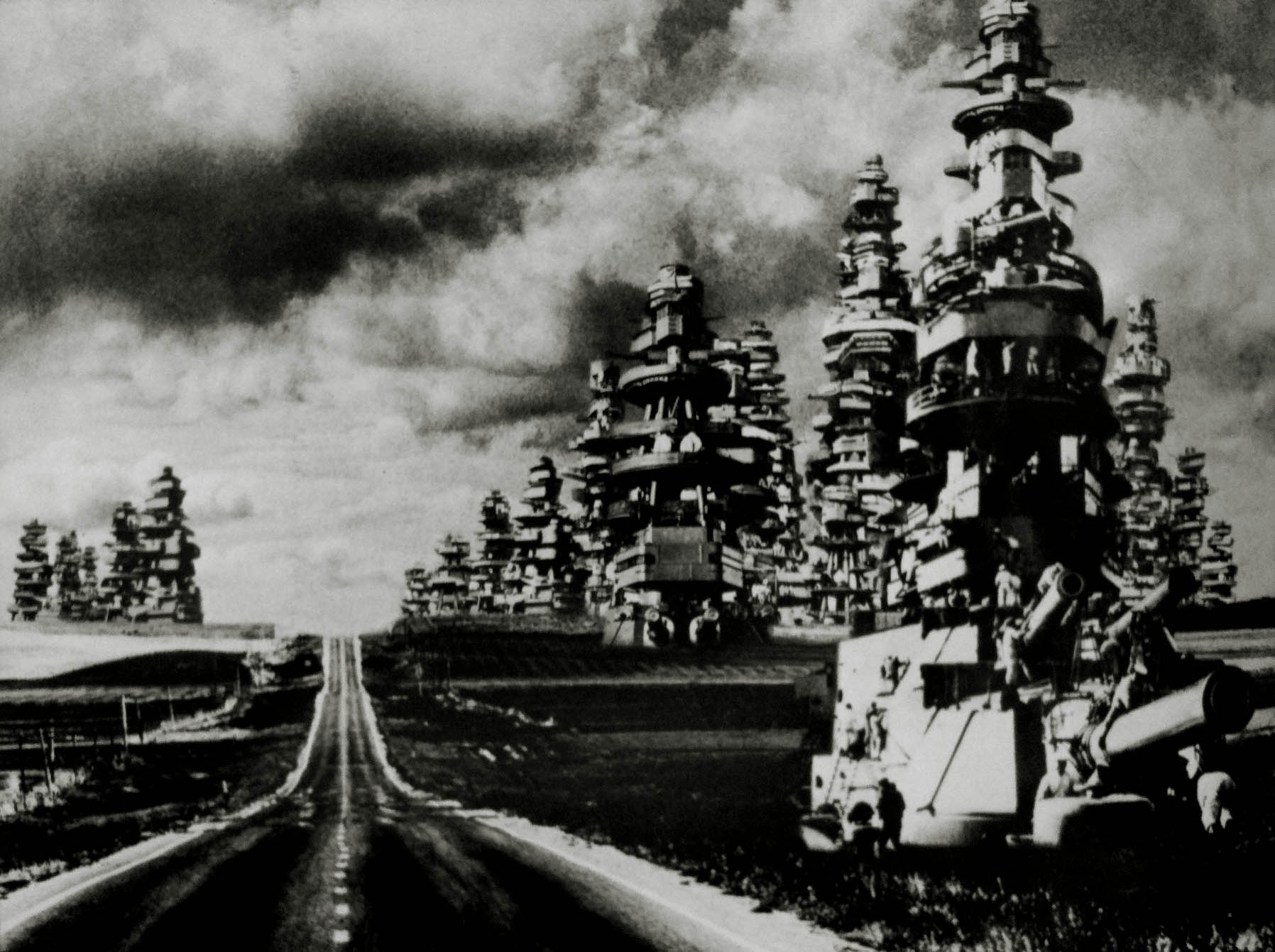 [Image: By Tsunehisa Kimura, from Tsunehisa Kimura’s Visual Scandals by Photomontage].
[Image: By Tsunehisa Kimura, from Tsunehisa Kimura’s Visual Scandals by Photomontage].
A copy of the 1979 book Tsunehisa Kimura’s Visual Scandals by Photomontage, now out of print, popped up the other day in the CCA library, and many of the images are jaw-dropping.
I photographed a few of the book’s glossy pages—as the scanner system here doesn’t really make sense to me—and I thought that three images, in particular, were of sufficient architectural interest to warrant posting.
 [Image: By Tsunehisa Kimura, from Tsunehisa Kimura’s Visual Scandals by Photomontage].
[Image: By Tsunehisa Kimura, from Tsunehisa Kimura’s Visual Scandals by Photomontage].
The artist—who passed away in 2008—was well-known for his startlingly realistic collages of urban scenes, often animated with a kind of end-of-the-world, scifi-inflected festivity. Impact craters in the centers of wrecked cities share chaotic page space with Dalí-esque visions of giant human breasts in the sky.
Waterfalls scour sublime new cliffsides from the architectural canyons of Manhattan; modern tower blocks pitch and yaw atop aircraft carriers at sea; battleship gun turrets are cloned and repeated into Baroque stupas—cathedrals of artillery—along the empty roads of agrarian landscapes. For my money, these latter structures outdo Hans Hollein’s Aircraft Carrier City in Landscape, with which they nonetheless share a certain tectonic similarity.
Gunnery pagodas and blasted metropolitan cores meet surreal scenes of burning astronauts on the moon, while the neon lights of artificial volcanoes melt nameless city districts under radiative tides of surprise eruption. Apollo rockets are unearthed from Mesopotamian tombs in the shadow of Stone Age petroleum tanks. Tatlin’s Tower stands proud in a junkyard, stuffed full of broken TVs. The Woolworth Building wakes up to find itself at the bottom of a cave, and there are construction sites everywhere.
 [Image: By Tsunehisa Kimura, from Tsunehisa Kimura’s Visual Scandals by Photomontage].
[Image: By Tsunehisa Kimura, from Tsunehisa Kimura’s Visual Scandals by Photomontage].
However, these are not the explicitly psychedelic photo-collages of someone like, say, James Koehnline, in which machine-mandalas and nude fakirs intermix with jungle leaves inside heavily tiled cosmic temples. They are more like diagnostic slices taken through a militarized imagination formed in the context of post-War Japan.
In some ways, in fact, I’m reminded of an interview with Paul Virilio, published in AA Files a few years back. There, Virilio quips that “The Second World War was my university,” and he goes on to describe the various ways in which abandoned military fortifications and the total annihilation of once-thriving cities affected his ideas of what architecture should be.
Tsunehisa Kimura’s “visual scandals,” I’d suggest, bring together a similarly rogue education—star pupils in a university of war—with a Ballardian afterglow, a nuclear flash from the Pacific Rim, delivering images of cities that escaped erasure by American bombs only to be buried under electronic goods of Japan’s own making, sometimes literally faceless citizens staggering through landscapes no one ever thought the last century would bring.
Good to see some more of this work. I know the Manhattan picture from the cover of Site Anubis, a 1996 album by Paul Schütze's Phantom City group. You'd probably like Paul's short fiction piece inside the CD which describes an urban cataclysm caused by the appearance of an eight-hundred foot tall basalt statue. The day after I bought the CD the city centre here in Manchester was destroyed by a massive IRA bomb; I've never been able to disassociate Paul's story piece and that event.
Whoa. Thanks for the big scans. Definitely will be looking into this fellow.
Wow. Jaw-dropping is the word.
I always assumed that Virilio's Bunker Archaeology must be a touchstone for you given your interests. But your reference to him here made me wonder. If you haven't looked at it I'm sure you will enjoy it.
Also puts me in mind of Tadanori Yokoo's collages for Miles Davis' Agharta, photographed here: http://www.hardformat.org/3253/miles-davis-agharta/. I'm tempted to track down this book, but the price is rather steep for my pocket. Would you say that the imagery is as consistently brilliant as these examples?
great work. would love to see more. reminds me of some of the collage work Martha Rosler did during the Vietnam war.
(http://enderender.wordpress.com/2010/05/24/martha-rosler)
love the images.
Brillant, It reminds me an image i found on flickr :
http://www.flickr.com/photos/41817378@N02/4251581147/
It's both amusing and depressing to find that this article repeatedly misspelled the artists's name *and* that nobody so far has pointed it out. It's KIMURA, not Kumura (a name that, as far as I know, doesn't even exist in Japanese).
Anonymous (July 31, 12:30am), thanks for the heads up.
Wow, and I thought Cut Copy made the Manhattan image….. Check out their new album cover – Zonoscope. I was clearly mistaken!